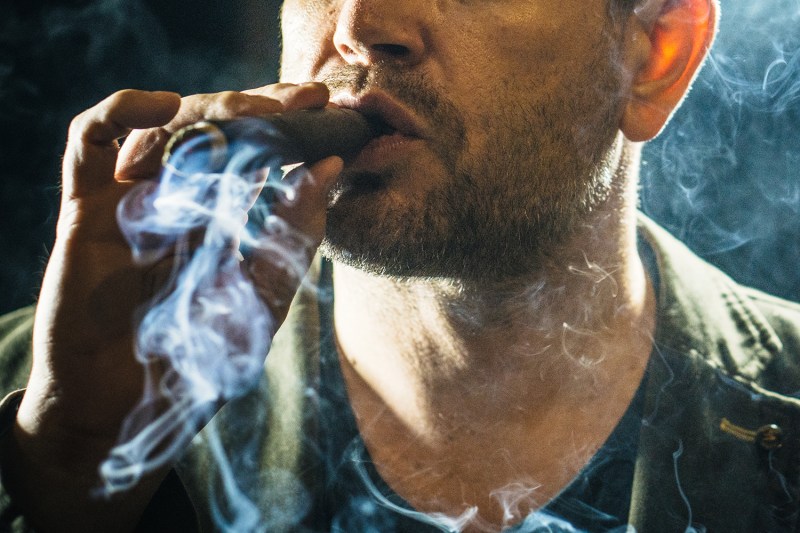
Many of life’s most pleasurable experiences come with less-than-pleasant aftermath. For example, An evening of indulgence in bourbon and beer brings a hangover as retribution, a great climb or hike leaves its share of lactic acid in those worn-out muscles, and a day spent lounging about on the beach or poolside can bring a sunburn and questions like, “Hey, why aren’t you at work?”
Puffing on a fine cigar at a get-together or quietly enjoying one as you leaf through the pages of a book might be excellent ways to pass some time, but no matter how you enjoy that stogie, the result will be the same: cigar smell.
The smoke you draw into your mouth and then deftly exhale in a series of perfect rings may taste great, yet the taste left in your mouth post-smoke, that infamous cigar breath, can taste like asphalt. From your clothing and upholstery to the very carpets and walls of your home, everything can be left reeking with cigar odor for days after a smoking session — or even become permanently infused with that musty aroma of old stogies.
But don’t worry! I’m here to help. And fortunately, I got some help from a bonafide cigar expert, Michael Herklots, who is also the vice president of retail and brand development for the vaunted tobacco brand, Nat Sherman. Not only does Herklots know a thing or ten about proper cigar selection, cutting, lighting, smoking, and so forth, but he’s also an expert in mitigating the “side effects” of cigars.
If you love puffing away on a fine cigar, but you (or your partner) hate the aftermath — the way it makes your breath, clothes, and house smell, read on.
Related Readings
- How to Smoke a Cigar Like You Actually Know What You’re Doing
- A Beginner’s Guide to the Most Common Types of Cigars
- Mild, Medium, or Bold: Which Cigar Strength to Choose?
- Cigar Humidors 101: What They Are, How They Work, and the Best Picks
How to get rid of cigar breath
Cigar breath is not solely from cigars. Bad breath stems from several factors, including what you ate, drank, and did throughout the day.
Assuming you maintain the standard operating procedure — brush and floss after every meal –, you may also want to consider chewing sugar-free gum before and after your cigar-smoking session. More importantly, be sure to drink plenty of water during the day and during your cigar consumption. It not only helps with your potential hangover, but it also keeps your mouth wet and things moving down the shoot.
First, brush your teeth. Second, dilute hydrogen peroxide with water in equal parts, take a swig, swish it around, and gargle with it. Take another swig, and brush your teeth using the diluted rinse. And please, do not forget your tongue. Lastly, use mouthwash.
Breath is as much a function of your stomach as it is your mouth and the tubes that connect them. When you get home — after hanging your suit, brushing it, and steaming it — it’s time to brush and steam yourself. So, in you go to the hot shower. Get something with some texture and pores (face cloth, loofah, the pink poofy thing on a string), lather it up, and scrub. Getting the outermost layer of skin off your body gives you a fresh start (and smell). Wash your hair. Condition it. Drink another glass of water, with or without four ibuprofen.
How to get rid of cigar smell in clothing

Clothing is porous. It will smell like whatever it’s exposed to. Spend an afternoon in the diner? You smell like the diner. Spend an afternoon at the beach? You smell like the beach. Spending time around combustible, premium cigars will leave your garments smelling like smoke.
The care for your garments isn’t much different after cigar smoke than with any other significant influencing aroma. Consider your personal bouquet after barbecuing all afternoon: It might be hard for you to notice after the 12 beers you had, but ask your friends — they’ll tell you. Unfortunately, we can’t jump in the pool wearing our three-piece, so maybe the process is a little different, but garment care is garment care.
You’ll need a few things. First, get a garment brush. Not the red fabric thing with the plastic handle from a drug store that you pull lint off your sweater with. A real garment brush! A good one. You’ll also need a steamer. Not your iron with a steam function. And not your shower on full blast. A real steamer.
Hang your garment somewhere exposed to fresh air. If you have a safe place outdoors that’s covered, that’s ideal. Next, brush your garment, which helps remove whatever might be in the fibers of the fabric that could be causing odor: ashes, dust, dirt. Etc. After you’ve brushed your garment, steam it thoroughly, then re-brush it to be sure everything that could be adding or maintaining odor is finally removed. Finally, let your garment breathe overnight. The following day, you’re good to go. Use a light fabric spray if you still feel some lingering aroma.
Why does cigar smoke smell so bad?
Cigar smoke smells bad because it contains many harmful chemicals, including:
- Tar: Tar is a sticky, black substance produced when tobacco is burned. Tar can coat the lungs and make it difficult to breathe.
- Nicotine: Nicotine is highly addictive and can cause several health problems, including heart disease, stroke, and cancer.
- Carbon monoxide: Carbon monoxide is a poisonous gas that can reduce the amount of oxygen in the blood.
- Hydrogen cyanide: Hydrogen cyanide is a poisonous gas that can cause respiratory problems.
In addition to these harmful chemicals, cigar smoke contains many other substances that can give it a strong, unpleasant odor. These chemicals include:
- Aromatic hydrocarbons: Aromatic hydrocarbons are a group of chemicals that can cause cancer.
- Polycyclic aromatic hydrocarbons (PAHs): PAHs are a group of chemicals that can cause cancer and other health problems.
- Nitrosamines: Nitrosamines are a group of chemicals that can cause cancer.
The smell of cigar smoke can be powerful and unpleasant and linger for a long time. The smell of cigar smoke can be harmful to both smokers and non-smokers. Smokers who inhale cigar smoke are at an increased risk of developing several health problems, including heart disease, stroke, cancer, and lung diseases. Non-smokers exposed to cigar smoke are also at an increased risk of developing these health problems.
If you are considering smoking a cigar, it is crucial to weigh the risks and benefits carefully. If you decide to smoke a cigar, it is important to do so safely and responsibly.
How to get rid of the cigar smell in your house

Cook fish in the kitchen? The house smells like a fish market. Light a Christmas candle? The house smells like Santa’s factory. Fire up a cigar indoors? It’s going to smell like cigar smoke.
The key while smoking is exhaust. You want as little smoke to remain in the room as possible. You may open two windows for cross-ventilation or use an exhaust fan to remove the smoke while actively smoking.
Next comes filtration and cleaning the air. Ionizers are great to leave on after you’ve finished smoking but can be acrid smelling during smoking. Keep in mind that filtration is secondary to ventilation.
Third, add aroma. Light that candle. Just skip the plug-ins!
Last, eliminate anything that could allow the aroma to remain. Cigar ash, cigar butts — clean up after yourself. The hygiene of your environment is just as important as the hygiene of your body. If you have fabric in the room where you enjoy cigars (couches, carpets, rugs, etc.), you can either A) get rid of them, B) clean and deodorize them regularly, or C) reconsider option A).
And there you have it. Follow these steps, and you’ll be smoke-smell-free in no time.



